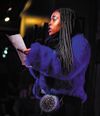Shutter2U/Getty Images, CC BY
Being Black at a predominantly white school causes us to feel intellectually and physically vulgarized in a variety of ways. First, there are the nefarious insults and pernicious slurs that are constantly being perpetrated amongst us; for example, being called the N-word (with a hard R), or being called a cotton picker. We are also dehumanized when we’re told we are like monkeys, or that we somehow have less brain power than the other races that surround us.
On many occasions, throughout the course of the school day, we have to bear with being treated as if our darker complexion, nappy textured strands, and bigger facial features are a disgrace — something to be commented on and criticized. Because of racist propaganda and stereotypes, a lot of non-Black students believe that if your hair isn’t straight — if it’s kinky and nappy — it’s unattractive, or not properly managed. That if your lips and nose are big, it’s not appealing. That if your skin is dark, you're ‘too Black’.
A lot of students also hold erroneous assumptions about us. They think that if we're Black, we're poor and grew up in the ghetto, and that we're stupid, incapable of attaining knowledge like others who are lighter-skinned than us. That if we talk or act Black, we’re ratchet. And if we ever get upset or react to others' heinousness, we’re thugs or ‘angry Black women’ who are then painted as the aggressors — as antagonists that deserve repercussions. And, of course, the people actually provoking us never receive consequences or punishment on account of their wrongdoings. The system paints those individuals as victims, even though they are the ones who stirred up the mayhem in the first place.
But despite all that, I want other Black students to realize that their afro is the unspoken truth and hidden connection to their heritage. It is the branches that grow like trees on wide fields, their roots spreading like wildfire. It is the fruits of their legacy and lifeline. It erupts electric, magnetic, hypnotic, and irresistible energy. That it has been here for generations upon generations. Their afro is what should remind them that they are magnificent! That they’re marvelous! That they’re exquisite! That they’re ravishing! That they’re radiant! That they’re dazzling! The afro is their crown.
I want other Black students to know that their braids are what flow from their heads like the blood that flows throughout the veins in their bodies. They are the thunder and lightning that connects the sea to the clouds. They are the twists and twirls that sway upon the flesh of their backs. They are connections to their ancestors’ braids that tell stories and draw maps. They are the alluring texture, tight against their scalps. They are what connects them to their internal Black magic and spark.
I want them to understand that their Black flesh being seen as a bullseye — as an invitation to scapegoat — is not normal. That their Black existence being treated as a mockery, or as some kind of underdog story, is unacceptable in every way. That their Blackness shouldn’t be treated as some sort of spectacle. That their darkness shouldn’t be devalued or cheapened. On the contrary, their beautiful dark complexions should be seen as beautiful — grand and marvelously made.
Schools are supposed to be giving us all the tools and resources to become successful beings, ready for the future. Ready for a life brimming with opportunities. We must never let fear thwart our calling. We must embrace our destinies, and be ready to conquer the world as our greatest selves, as individuals who are unapologetically and authentically us. It can be tempting to sugarcoat our existence — to minimize and dim down our genuine selves — in order to maneuver in white spaces. Instead, we have to embrace our Blackness, and move in complete, absolute authenticity, without doubt or question. No matter how isolated we feel in a sea of lighter skin shades that surrounds us.
Anyla aspires to become a poet, short story writer, and essayist speaking about racism against Black people, current world problems, and hot topics. When she writes, she does it with purpose and passion. Anyla feels destined to touch others with her words, and wants to be known as someone who takes a stand and impacts lives with her writing.


